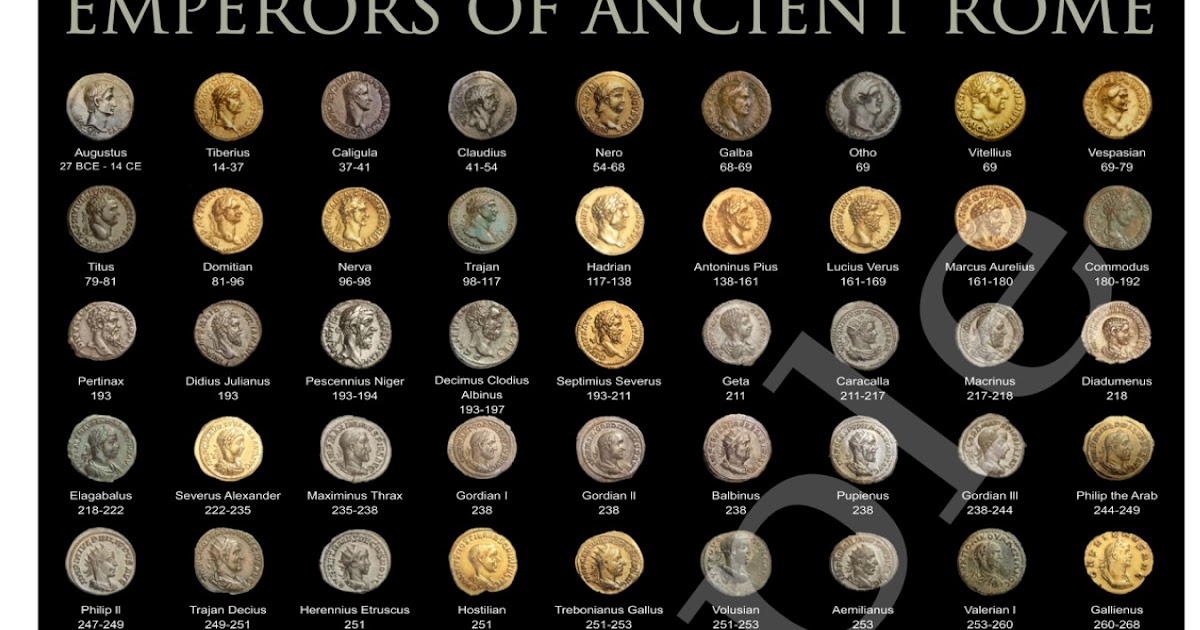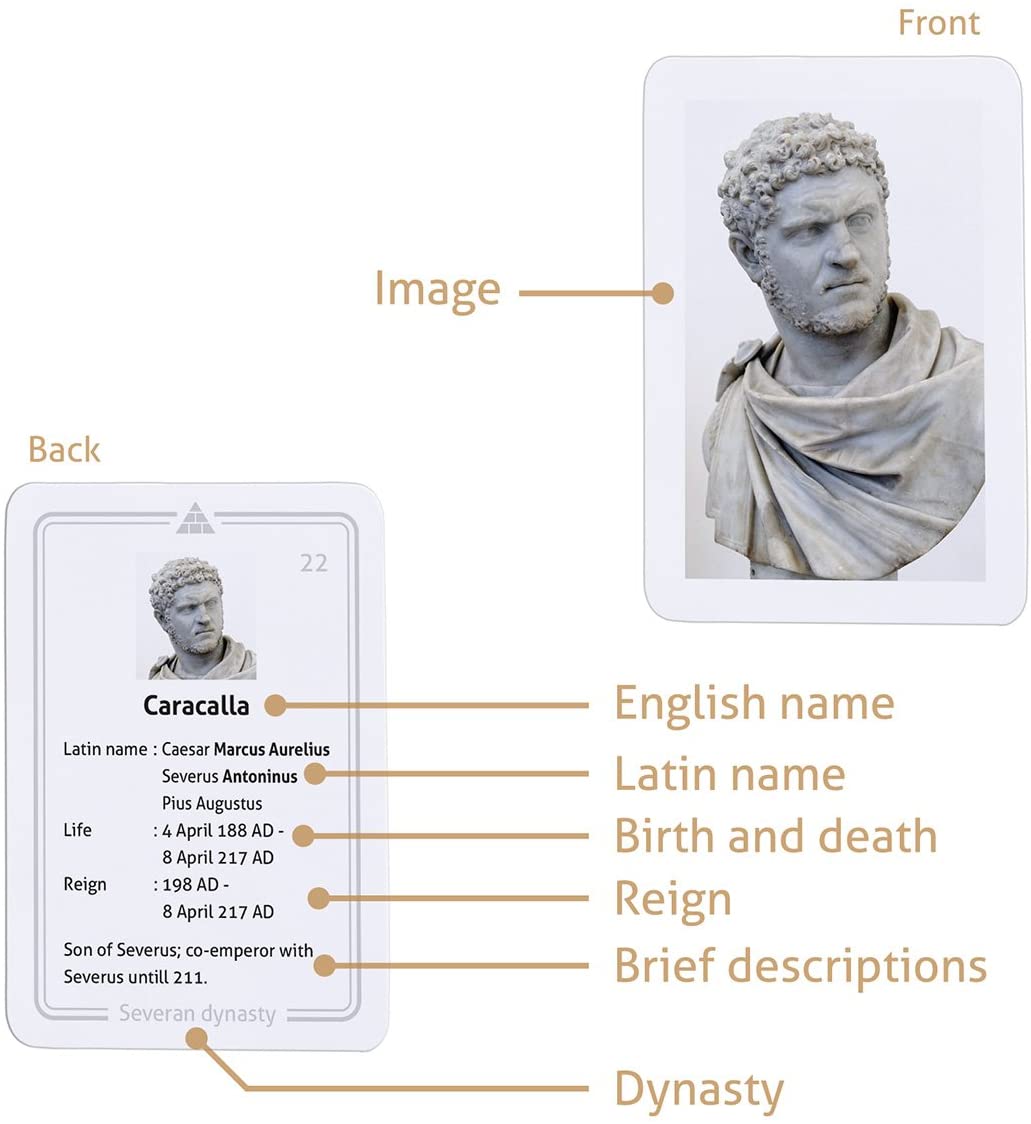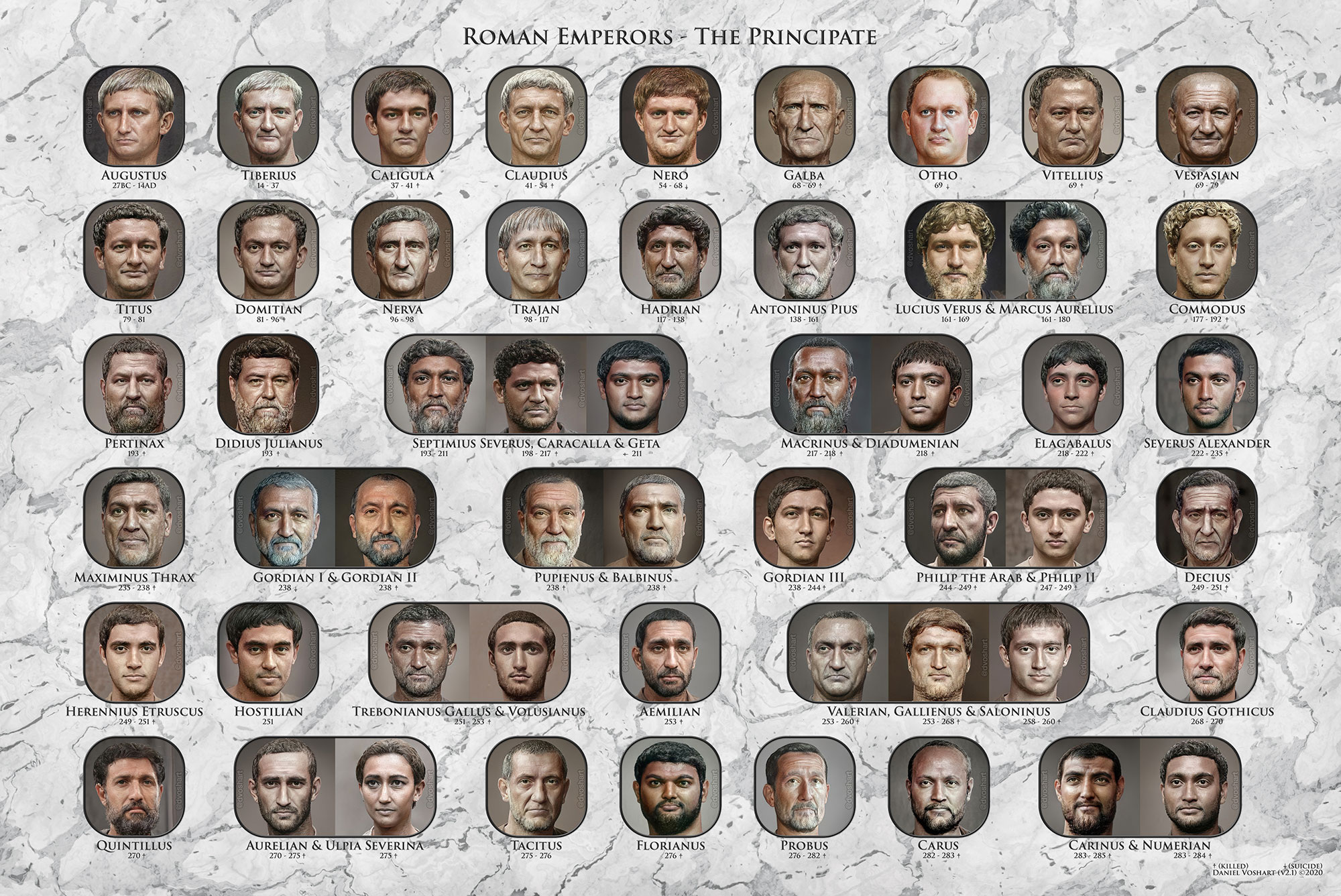
(Revised) Timeline of the Roman emperors from Augustus to Justinian r/ancientrome
First Roman Emperor to commit suicide. Year of the Four Emperors. Galba, military leader under Claudius. Otho, friend of Nero. Vitellius, military leader under Galba. Vitellius banned astrologers from Rome. Flavian dynasty. Vespasian, military leader under Claudius. Vespasian began the building of the Colosseum.

ROMAN EMPERORS LIST Roman history, Roman emperor, Ancient history
Numerous educational institutions recommend us, including Oxford University.Our publication has been reviewed for educational use by Common Sense Education, Internet Scout (University of Wisconsin), Merlot (California State University), OER Commons and the School Library Journal.Please note that some of these recommendations are listed under our old name, Ancient History Encyclopedia.

Pin on Be WellRead
A famous statue of Augustus (r. 27 BC - AD 14), the first Roman emperor The Roman emperors were the rulers of the Roman Empire from the granting of the name and title Augustus to Octavian by the Roman Senate in 27 BC onward. Augustus maintained a facade of Republican rule, rejecting monarchical titles but calling himself princeps senatus (first man of the Senate) and princeps civitatis.

Roman Emperors family tree and timeline Roman emperor, Family tree poster, Greek mythology
The Roman empire derives its origin from the Roman Republic after its ascent to the dominant power in Europe. Thus, Augustus, who is universally considered the first Roman emperor, was careful to always maintain the facade of republican rule, and did not take up any specific title to mark his rule, which began in 27 B.C.

Orbis Coins and Maps Poster Emperors of Ancient Rome
Antoninus Pius 138-161. Marcus Aurelius 161-180. Commodus 178-193. Severan Dynasty. Septimius Severus 193-211. Caracalla 198-217. Geta 209-212. Macrinus 217-218. Elagabalus 218-222.

What was the order of the Roman emperors? Learn Latin Language Online
The Roman emperor was the ruler and monarchical head of state of the Roman Empire, starting with the granting of the title augustus to Octavian in 27 BC. The term "emperor" is a modern convention, and did not exist as such during the Empire. Often when a given Roman is described as becoming emperor in English, it reflects his taking of the title augustus and later basileus.

Timeline of the Roman Emperors Roman emperor, Roman empire, First citizens
Ten Caesars: Roman Emperors from Augustus to Constantine. Written by Strauss, Barry, published by Simon & Schuster (2020) $15.99. World History Encyclopedia is an Amazon Associate and earns a commission on qualifying book purchases. Add External Link.

Roman emperors (63 BC 476 AD) flash cards TopToy
Listen Now. Formerly 'Octavian', Augustus was the first Roman emperor. He made the army a formal constitution, created the Praetorian Guard, the Urban Cohorts and the Vigiles, and oversaw a great building project in Rome.. Despite his conservative nature, Augustus' reign witnessed a series of expansionist wars that resulted in the Roman Empire doubling in size (overshadowed by the.

The Roman Empire was rather stable until 235 AD and most Emperors remained in power for quite
1st Century CE. Augustus, 31 BCE - 14 CE - The first Roman emperor who brought about the Pax Romana, a period of peace and prosperity in Rome. Tiberius, 14-37 CE - Known for his reclusive and often controversial rule. Caligula, 37-41 CE - Infamous for his extravagance, cruelty, and erratic behavior. Claudius, 41-54 CE - A.

Timeline of the Roman and Byzantine Emperors Greek News On Demand / ΕΛΛΗΝΙΚΑ ΝΕΑ ΤΩΡΑ
Chronicle of the Emperors The Roman state began as a semi-mythical and small-scale monarchy in the 10th century BC. It later prospered as an expansionist republic from 509 BC onwards. Then, in 27 BC, it became an empire. Its leaders, the emperors of Rome, went on to become some of the most powerful heads of

emperors of rome list list of roman emperors Attila The Hun, Bible Mapping, Verus, Book Of
This is a chronologically ordered list of Roman emperors. See also Roman Empire and ancient

Timeline indicating the chronological lifespans of the Roman Emperors Lettering, Roman
The Roman Empire timeline is a long, complex, and intricate tale covering nearly 22 centuries.. When most of us think of ancient Rome we think of the massive list of Roman emperors who led this civilization. But there are hundreds of years of history before Rome was an empire to uncover. The complete timeline is here as well as links to additional resources to help you explore this vast and.

Politiek
Timelines and Chronologies of the Rulers of the Roman Empire. The period of the Roman Empire lasted for about 500 years before all that was left was the Byzantine Empire. The Byzantine period belongs to the Middle Ages. This site focuses on the period before Romulus Augustulus was removed from the imperial throne in A.D. 476.

historyarchaeologyartefacts List of Roman... CarolinaBlues
461-465 Libius Severus. 467-472 Anthemius. 468 Arvandus. 470 Romanus. 472 Olybrius. 473-474 Glycerius. 474-475 Julius Nepos. 475-476 Romulus Augustulus. This table takes you through the standard period of Roman emperors, from the end of the 1st century B.C. to the end of the 5th century A.D.

Facial Reconstructions of Roman Emperors (Illustration) World History Encyclopedia
By. N.S. Gill. Updated on June 30, 2019. Most of the first 12 emperors of the Roman Empire fall into two dynasties: the five Julio-Claudians (27 BCE-68 CE, including Augustus, Tiberius, Caligula, Claudius, and Nero) and the three Flavians (69-79 CE, Vespasian, Titus, and Domitian). Others on the list provided to us by the Roman historian.

Duración del gobierno de los emperadores romanos Roman emperor, Emperor, Marcus aurelius
The Roman emperors were the rulers of the Roman Empire from the granting of the name and title Augustus to Octavian by the Roman Senate in 27 BC onward. Augustus maintained a facade of Republican rule, rejecting monarchical titles but calling himself princeps senatus and princeps civitatis . The title of Augustus was conferred on his successors to the imperial position, and emperors gradually.